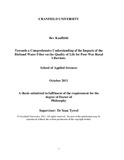JavaScript is disabled for your browser. Some features of this site may not work without it.
| dc.contributor.advisor | Tyrrel, Sean | |
| dc.contributor.author | Kauffeldt, Bev | |
| dc.date.accessioned | 2012-06-29T14:29:49Z | |
| dc.date.available | 2012-06-29T14:29:49Z | |
| dc.date.issued | 2011-10 | |
| dc.identifier.uri | http://dspace.lib.cranfield.ac.uk/handle/1826/7320 | |
| dc.description.abstract | Numerous forms of low-technology development interventions have been introduced and implemented in an effort to alleviate the cycle of poverty. Nowhere is this truer than in the water, sanitation and hygiene (WASH) sector, where countless technologies with the sole purpose of improving the quality of water for countries, communities and individuals have been invented and implemented. The technology is often effective in its purpose; however, this thesis will demonstrate how the context of the implementation can influence its impacts, resulting in intended and unintended development results. The aim of this thesis is to achieve a comprehensive understanding of the impacts that a key technology such as the BioSand water filter can have on the quality of life of people in post-war rural Liberia. A logical framework of the research was formulated in chapter one and adjusted to the research in chapter seven. Aspects of quality of life (QoL) indicators and measurements in post-war Liberia, challenges of post-war development and a low-technology WASH intervention, and the BioSand water filter (BSF) were investigated. Data was collected through observational studies over a six year period and through questionnaire and interview surveys of local people, key informants and the INGO community of Liberia. The BSF was used as a lens, as a demonstration of a type of development technology that has the potential to impact the QoL of its beneficiaries. The results ranged from finding unique QoL indicators that were not expected to elucidating the deep-seated psychosocial influences that a post-war context has on a population. Aspects of ownership, the sense of belonging and the desire to re-establish their lives proved to be the primary motivators that the research revealed – contrary to the intended health impact of the BSF. Coupled with these factors were the entrenched traditional beliefs that Liberians all share and which influence the implementation and impact of a project. From these findings, recommendations for INGOs in areas of pre-intervention QoL surveys and preliminary psychosocial community and individual assessments of conflict experiences have been noted. The most important recommendation for INGOs being to increase the time they spend and deepen their relationships with beneficiaries. This will increase the likelihood of a development intervention having the intended positive effects on the lives of those who have endured the pain of war. | en_UK |
| dc.language.iso | en | en_UK |
| dc.publisher | Cranfield University | en_UK |
| dc.rights | © Cranfield University, 2011. All rights reserved. No part of this publication may be reproduced without the written permission of the copyright holder. | en_UK |
| dc.title | Towards a comprehensive understanding of the impacts of the BioSand water filter on the quality of life for post-war rural Liberians | en_UK |
| dc.type | Thesis or dissertation | en_UK |
| dc.type.qualificationlevel | Doctoral | en_UK |
| dc.type.qualificationname | PhD | en_UK |
